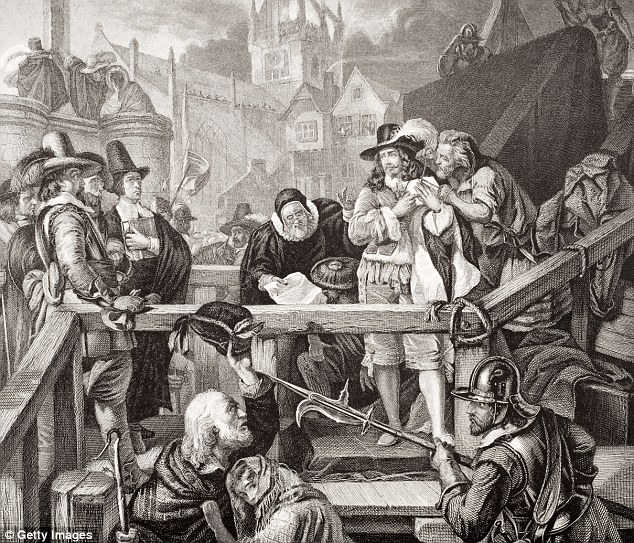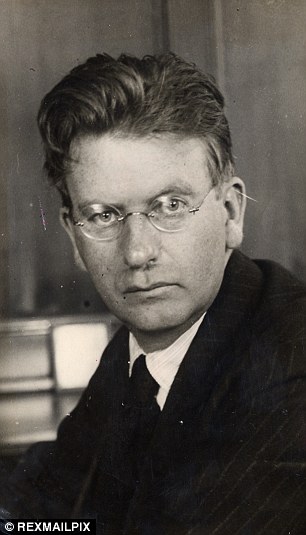Dan Snow is a historian who has presented many history documentaries on the BBC and other broadcasters and has a regular history slot on BBC One's The One Show. He is also the youngest son of BBC TV journalist Peter Snow; the first cousin, once removed, of Channel 4 news reporter Jon Snow; the nephew of Canadian historian Margaret MacMillan; and a great-great-grandson of former British Prime Minister David Lloyd George.
He is also a member of Better Together, the campaign to urge Scots to vote NO to independence on Thursday next week, and has taken to the streets campaigning for a NO vote.
In this fascinating account, he tells how the Union of two war-torn, pennilless nations - England and Scotland - a little over 300 years ago formed the new country Great Britain, probably the most successful country that has ever existed, which created the modern world.
DAN SNOW on the marriage that forged the modern world: Top TV historian's fascinating account of how the Union transformed two war-torn nations into one of the greatest countries ever
Daily Mail

Scotland has been a United Kingdom with England and Wales since 1707. That’s since before the U.S. existed. It’s been around twice as long as Germany. Only a handful of countries are older. But no other can match its record.
In that time no foreign enemy has ever occupied our capital, no revolution has bloodily swept away the old order and no dictator emerged to pick up the pieces.
Russia, France, Spain, China, Japan, and others might be older, but in the last 300 years every single one of them has experienced foreign occupation and having their governments overthrown. We have not.
That alone makes the Union of England and Scotland a stunning success. Such a success that everyone else around the world is looking on in amazement as the campaign to separate Scotland reaches a dramatic climax.
Perhaps it is the fate of our island once again to be divided. Perhaps the arbitrary line drawn through the Cheviot Hills by medieval warlords will be reinstated.
But we in the rest of the UK must not let this happen without at least pausing to speak out in defence of one of the most successful countries that has ever existed. Britain will not have gone to its grave without a fight.
The irony is that the United Kingdom’s prospects at birth were grim. Fourteen hundred years ago, the first great home-grown historian, Bede, explained that this island was held in a state of perpetual warfare by at least four different peoples who lived cheek by jowl: the English, Picts, Welsh and Scots.
These peoples spent even more time fighting themselves, their petty lordships and kingdoms locked in almost permanent civil war. The people of these islands were weak and divided, they seemed destined to be the victims of outside aggression rather than a people in command of their own destiny.
Much later, by the 17th century, the British Isles had been torn apart by civil war, and a higher proportion of its population had been violently killed than in any other war in the last 500 years, including both world wars.
Scotland and England had invaded each other, a king had been sent to the scaffold, religious extremism divided communities and military dictatorship (Oliver Cromwell and then his son Richard) had taken a firm, if short-lived, grip.


Our island was now desperately vulnerable. In 1667, a Dutch fleet sailed up the Medway in Kent and ambushed the Royal Navy lying helplessly at anchor, unable to put to sea due to a lack of funds. The Dutch seized the flagship which they towed back to Holland as a prize; her stern still sits like a trophy of war in a museum in Amsterdam.
By the time Dutchman William of Orange invaded in 1688, with the English army disintegrated, he found the Treasury empty and the politics dysfunctional. Two years later the French trounced the Royal Navy off Beachy Head, and England’s coast lay at their mercy.
HMS Anne fled from the scene of the battle — her captain drove her ashore near Rye in East Sussex and burnt her himself rather than let her fall into the hands of the French. (Today the rotting ribs of this vessel are one of the most beautiful and thought-provoking wrecks in Britain. They are a stark reminder of what might have been: what the world looked like when Britannia did not rule the waves.)
Then, in 1707, something remarkable happened. Scotland joined England and Wales (which had been unified together as the Kingdom of England ever since Wales came into being) in an Act of Union. These war-torn, penniless states came together, and the world would never be the same again.

The wreck of HMS Anne
The explosion of creativity, economic and intellectual activity, scientific experimentation and entrepreneurial activity was a marvel. Freed from the petty concerns of internal competition, the people on this island came together with an energy that left the rest of the world blinking in disbelief and scrambling wildly to emulate it. The national collaboration between England and Scotland was mirrored up and down the land as individual English and Scots joined forces. The result of these thousands of connections was a giant chain reaction that laid the foundations for the modern world.
Keen to put the humiliation of their bankrupt armed forces behind them, England’s leaders built the financial mechanisms that would allow the country to pay for its basic survival. To do so, they turned to a Scot. On William Paterson’s recommendation, the Bank of England was created in 1694. It would provide the government with a reliable source of income to fund, in the first instance, the strengthening of the Navy which would guard the trade on which government income depended.
Inspired by its success and glimpsing the potential of the Anglo-Scottish collaboration that had led to its birth, Paterson became a keen proponent of a union between England and Scotland, which he helped to broker, just over ten years later.
The Union helped to unlock the vast potential of the British. Just as the Bank of England became the model for new countries building their central banks, so developments in industry, economics and politics would act as beacons that the rest of the world sought to copy.
James Watt was born on the shores of the Clyde. He studied in London and then worked as a technician at the University of Glasgow. Gradually he started tinkering with steam engines, the exciting new technology of the time.
His improvements to them would utterly transform them into the machines that would build the Industrial Revolution and begin the mechanisation of our world.
Proud history: The union has lasted 300 years



He was supported during his early experiments by his business partner John Roebuck, an Englishman who was in Scotland having co-funded one of the world’s leading cannon manufacturers, the Carron Ironworks.
Later in his career, Watt moved to Birmingham where he formed a spectacular collaboration with local lad, Matthew Boulton. Together they built the engines that sent Britain into a position of total, global industrial mastery.
This was a story repeated a thousand times. Englishman Charles Darwin revolutionised our view of ourselves after studying at Edinburgh University. Scotsman Adam Smith spelt out the way in which a modern market economy works after studying at Oxford.
John Logie Baird, born in Dunbartonshire, moved to Hastings and in a rented workshop in the seaside town's Queen Anne’s Arcade he built the first television set using a tea chest, a pair of scissors and some bicycle lights.
Alexander Fleming was born in Ayrshire and moved to London where, in a lab in Paddington, he discovered penicillin, a discovery that would save millions of lives and win him a Nobel Prize.



Peter Higgs, an English physicist, went in the other direction. He was born in Newcastle and while at Edinburgh University hypothesised about the existence of a particle which would help unlock the secrets of the universe. He also won a Nobel Prize when the Higgs boson was proved to exist in 2012.
The UK was able to protect its citizens. HMS Victory was the most complex and awesome machine on the planet by the Battle of Trafalgar in 1805.
Her hull was sheathed in Welsh copper, her heavy carronades on the upper deck were Scottish and her famous Admiral Nelson, an Englishman.
A medieval chronicler once pointed out that if the Welsh stopped fighting among themselves they would be truly formidable. ‘If they were inseparable, they would be insuperable.’
His comments applied to all the inhabitants of this island. The most inspiring and uplifting aspect of the Union was its ability to bring together people of different languages, ethnicities and locations to work together in harmony.
There is no United Kingdom without Scotland. A Yes vote will be the start, not the finish, of a political and economic crisis that will fester and turn us against our fellow citizens.
For the next seven days we have politics that is far too important to be left to politicians. That is why I came together with over 200 public figures, from Stephen Hawking to Judi Dench and Paul McCartney to David Attenborough, to stand up for a country we think brings untold benefits to us, and the wider world.
So far tens of thousands of people have added their signatures to ours online. We cannot tell the Scots how to vote, but we can let them know how we feel about them, what we have achieved together, and what we believe the future holds if we continue to work together and not focus on what divides us.
Please go to www.LetsStay Together.org.uk and join us. Add your name and tell your friends that when the crisis threatened to engulf a country that has nurtured and protected us, you did not sit silently.
Add your name to tell the Scottish voters that, while the decision is rightly theirs, we hope with all our hearts that we stay together.
Last edited: